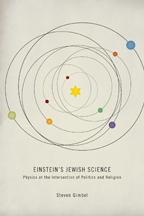Últimos assuntos
Tópicos mais visitados
Tópicos mais ativos

Steven Gimbel - A ciência judaica de Einstein
Página 1 de 1
05072012

 Steven Gimbel - A ciência judaica de Einstein
Steven Gimbel - A ciência judaica de Einstein
Sexta-feira, Junho 29, 2012

Einstein's Jewish Science
Physics at the Intersection of Politics and Religion
Steven Gimbel
Is relativity Jewish? The Nazis denigrated Albert Einstein's revolutionary theory by calling it "Jewish science," a charge typical of the ideological excesses of Hitler and his followers. Philosopher of science Steven Gimbel explores the many meanings of this provocative phrase and considers whether there is any sense in which Einstein's theory of relativity is Jewish.
Arguing that we must take seriously the possibility that the Nazis were in some measure correct, Gimbel examines Einstein and his work to explore how beliefs, background, and environment may—or may not—have influenced the work of the scientist. You cannot understand Einstein's science, Gimbel declares, without knowing the history, religion, and philosophy that influenced it.
No one, especially Einstein himself, denies Einstein's Jewish heritage, but many are uncomfortable saying that he was being a Jew while he was at his desk working. To understand what "Jewish" means for Einstein's work, Gimbel first explores the many definitions of "Jewish" and asks whether there are elements of Talmudic thinking apparent in Einstein's theory of relativity. He applies this line of inquiry to other scientists, including Isaac Newton, René Descartes, Sigmund Freud, and Émile Durkheim, to consider whether their specific religious beliefs or backgrounds manifested in their scientific endeavors.
Einstein's Jewish Science intertwines science, history, philosophy, theology, and politics in fresh and fascinating ways to solve the multifaceted riddle of what religion means—and what it means to science. There are some senses, Gimbel claims, in which Jews can find a special connection to E = mc2, and this claim leads to the engaging, spirited debate at the heart of this book.
"In this wide-ranging exploration, Gimbel... seeks to discover whether and to what extent Einstein's work could legitimately be called 'Jewish' and what difference it makes."—Publishers Weekly
"A fascinating engagement with the nature of Judaism and of science. By exploring and, in a sense, redeeming the Nazi accusation that Einstein's relativity theory is 'Jewish science,' Gimbel not only challenges the racist meanings of that charge but shows how scientific theories must in fact reflect the issues and concerns of the historical periods which give rise to them. This book is certain to generate much interest and will stimulate an important and understudied debate."—Rabbi Michael Lerner
"From its unnerving premise—maybe the Nazis were right, and Einstein's physics is 'Jewish science' after all—to its contrarian conclusions, Einstein's Jewish Science is a bruiser of a book. It asks questions and floats hypotheses that strain academic etiquette. With unflagging 'out-of-the-box-itude,' Gimbel reinterprets modern science and modern Judaism in a way that is sometimes exasperating, often challenging, frequently inspired and always riveting. You may not be persuaded, but after grappling with this book, you are sure to see in a new light both science and Jews of the twentieth century."—Noah Efron, Graduate Program in Science, Technology and Society, Bar Ilan University
Steven Gimbel is the Edwin T. and Cynthia Shearer Johnson Professor for Distinguished Teaching in the Humanities and chair of the Department of Philosophy at Gettysburg College, where he won the Luther and Bernice Johnson Award for Distinguished Teaching. He is author of Exploring the Scientific Method: Cases and Questions; René Descartes: The Search for Certainty; and Defending Einstein: Hans Reichenbach's Writings on Space, Time, and Motion.
Related Links:
Publisher's Weekly review
Steven Gimbel's TEDx talk based on his book
[video]
Related Books:
Einstein: A Biography
Jürgen Neffe
translated by Shelley Frisch
Source/Fonte: The Johns Hopkins University Press
Steven Gimbel - A ciência judaica de Einstein

Einstein's Jewish Science
Physics at the Intersection of Politics and Religion
Steven Gimbel
Is relativity Jewish? The Nazis denigrated Albert Einstein's revolutionary theory by calling it "Jewish science," a charge typical of the ideological excesses of Hitler and his followers. Philosopher of science Steven Gimbel explores the many meanings of this provocative phrase and considers whether there is any sense in which Einstein's theory of relativity is Jewish.
Arguing that we must take seriously the possibility that the Nazis were in some measure correct, Gimbel examines Einstein and his work to explore how beliefs, background, and environment may—or may not—have influenced the work of the scientist. You cannot understand Einstein's science, Gimbel declares, without knowing the history, religion, and philosophy that influenced it.
No one, especially Einstein himself, denies Einstein's Jewish heritage, but many are uncomfortable saying that he was being a Jew while he was at his desk working. To understand what "Jewish" means for Einstein's work, Gimbel first explores the many definitions of "Jewish" and asks whether there are elements of Talmudic thinking apparent in Einstein's theory of relativity. He applies this line of inquiry to other scientists, including Isaac Newton, René Descartes, Sigmund Freud, and Émile Durkheim, to consider whether their specific religious beliefs or backgrounds manifested in their scientific endeavors.
Einstein's Jewish Science intertwines science, history, philosophy, theology, and politics in fresh and fascinating ways to solve the multifaceted riddle of what religion means—and what it means to science. There are some senses, Gimbel claims, in which Jews can find a special connection to E = mc2, and this claim leads to the engaging, spirited debate at the heart of this book.
"In this wide-ranging exploration, Gimbel... seeks to discover whether and to what extent Einstein's work could legitimately be called 'Jewish' and what difference it makes."—Publishers Weekly
"A fascinating engagement with the nature of Judaism and of science. By exploring and, in a sense, redeeming the Nazi accusation that Einstein's relativity theory is 'Jewish science,' Gimbel not only challenges the racist meanings of that charge but shows how scientific theories must in fact reflect the issues and concerns of the historical periods which give rise to them. This book is certain to generate much interest and will stimulate an important and understudied debate."—Rabbi Michael Lerner
"From its unnerving premise—maybe the Nazis were right, and Einstein's physics is 'Jewish science' after all—to its contrarian conclusions, Einstein's Jewish Science is a bruiser of a book. It asks questions and floats hypotheses that strain academic etiquette. With unflagging 'out-of-the-box-itude,' Gimbel reinterprets modern science and modern Judaism in a way that is sometimes exasperating, often challenging, frequently inspired and always riveting. You may not be persuaded, but after grappling with this book, you are sure to see in a new light both science and Jews of the twentieth century."—Noah Efron, Graduate Program in Science, Technology and Society, Bar Ilan University
Steven Gimbel is the Edwin T. and Cynthia Shearer Johnson Professor for Distinguished Teaching in the Humanities and chair of the Department of Philosophy at Gettysburg College, where he won the Luther and Bernice Johnson Award for Distinguished Teaching. He is author of Exploring the Scientific Method: Cases and Questions; René Descartes: The Search for Certainty; and Defending Einstein: Hans Reichenbach's Writings on Space, Time, and Motion.
Related Links:
Publisher's Weekly review
Steven Gimbel's TEDx talk based on his book
[video]
Related Books:
Einstein: A Biography
Jürgen Neffe
translated by Shelley Frisch
Source/Fonte: The Johns Hopkins University Press
Steven Gimbel - A ciência judaica de Einstein

Eduardo- Mensagens : 5997
Idade : 54
Inscrição : 08/05/2010
 Tópicos semelhantes
Tópicos semelhantes» A sinagoga na cultura judaica
» O colapso das abelhas: Einstein estava certo
» Deus Existe - Comercial da Macedônia (Albert Einstein)
» O início da teoria quântica: Max Planck e Albert Einstein
» O colapso das abelhas: Einstein estava certo
» Deus Existe - Comercial da Macedônia (Albert Einstein)
» O início da teoria quântica: Max Planck e Albert Einstein
Permissões neste sub-fórum
Não podes responder a tópicos
 Início
Início








 Seja fã Forumeiros
Seja fã Forumeiros
» Acordem adventistas...
» O que Vestir Para Ir à Igreja?
» Ir para o céu?
» Chat do Forum
» TV Novo Tempo...
» Lutas de MMA são usadas como estratégia por Igreja Evangélica para atrair mais fiéis
» Lew Wallace, autor do célebre livro «Ben-Hur», converteu-se quando o escrevia
» Ex-pastor evangélico é batizado no Pará
» Citações de Ellen White sobre a Vida em Outros Planetas Não Caídos em Pecado
» Viagem ao Sobrenatural - Roger Morneau
» As aparições de Jesus após sua morte não poderiam ter sido alucinações?